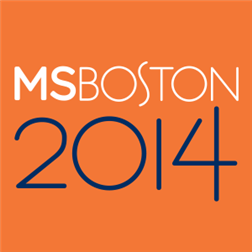Largest Multiple Sclerosis Conference Begins in Boston; 8,000 Attendees Expected
Written by |

 See below for the complete schedule for this year’s ACTRIMS-ECTRIMS Multiple Sclerosis conference in Boston, and stay tuned to Multiple Sclerosis News throughout the week for continuing coverage on breaking science and research news for MS.
See below for the complete schedule for this year’s ACTRIMS-ECTRIMS Multiple Sclerosis conference in Boston, and stay tuned to Multiple Sclerosis News throughout the week for continuing coverage on breaking science and research news for MS.
For the past few weeks, Multiple Sclerosis News Today has been following the lead-up to the largest international multiple sclerosis conference this year — the joint ACTRIMS-ECTRIMS triennial meeting, MSBoston 2014. This highly anticipated summit of leading and emerging biotechnology companies, as well as esteemed medical professionals and researchers kicks off today, September 10th, at the Hynes Convention Center in Boston, and will conclude on the 13th.
An estimated 8,000 people from all over the globe will be attending this giant event on everything related to the research, treatment, and advocacy for MS. The scheduled presentations, lectures, and open forums will cover a wide range of topics on this neurodegenerative disease such as possible causes and risk factors, and the latest on new treatments and research initiatives. MSBoston 2014 will offer numerous opportunities for interactive discussions with industry experts, and actual MS patients.
Additionally, throughout the course of the conference, the organizing committee will be making themselves visible to media coverage for the purpose of providing supplementary information, clarification, and arranging exclusive forums with certain presenters and key personalities.
Listed below are the schedules of presentations under the Scientific Program, and Education Program of the conference. For more information, visit https://msboston2014.org/.
[adrotate group=”4″]
THURSDAY, 11 SEPTEMBER
- Approaching the cause of multiple sclerosis, D. Hafler, Yale School of Medicine, New Haven, CT, [email protected], Auditorium, 9:00 a.m.
This plenary presentation will examine the impact that environmental stimuli interacting with genetic factors could have on the cause of this disease.
- Functional brain network: linking thalamic atrophy to clinical disability in multiple sclerosis, P. Tewarie, VU University Medical Center, Amsterdam, [email protected], Grand Ballroom, 10:30 a.m.
The study findings are a step towards clarifying that thalamic atrophy in MS are related to widespread disruption of brain networks and how the interplay between these eventually could lead to clinical and cognitive problems.
- Natalizumab-associated JC virus (JCV) granule cell neuronopathy (GCN) complicated by immune reconstitution inflammatory syndrome in a patient with MS, S. Agnihotri, Beth Israel Deaconess Medical Center, Boston, MA, [email protected], Auditorium, 2:00 p.m.
Natalizumab has been associated with reactivation of JC virus leading to progressive multifocal leukoencephalopathy in MS patients. This presentation will discuss natalizumab-associated JC virus (JCV) granule cell neuronopathy. It will also elucidate on how natalizumab withdrawal may be complicated by JCV GCN immune reconstitution inflammatory syndrome (IRIS) and may require treatment with corticosteroids.
FRIDAY, 12 SEPTEMBER
- Primary Results of DECIDE Trial: a randomized, double-blind, double-dummy, active controlled trial of daclizumab HYP (DAC HYP) vs Interferon beta-1a in Relapsing Remitting MS (RRMS) patients, L. Kappos, [email protected], Auditorium, 8:15 a.m.
The primary results of the DECIDE Trial is to test the hypothesis that DAC HYP 150 mg is superior to Interferon beta-1a in reducing MS activity in patients with relapsing remitting MS (RRMS). This presentation will provide an assessment of the efficacy of daclizumab high-yield process, a humanized IgG1 monoclonal antibody, and detail whether it is superior to Interferon beta-1a in reducing MS activity in patients with RRMS.
- Generic glatiramer acetate is equivalent to copaxone on efficacy and safety: results of the randomized double-blind GATE trial in multiple sclerosis, J.A. Cohen, Cleveland Clinic, Cleveland, OH, [email protected], Auditorium, 8:15 a.m.
Findings from the GATE trial, which aims to show that generic glatiramer acetate (GTR) is equivalent to copaxone in efficacy and safety, will be presented. GTR is the first generic glatiramer acetate with an efficacy and safety profile that has demonstrated its equivalence to the currently marketed product.
- Maximal lifetime brain growth (estimated with intracranial volume) predicts disability progression measured with the expanded disability status scale, J.F. Sumowski, Kessler Foundation, [email protected] or [email protected], Small Ballroom (302-304-306), 8:15 a.m.
The findings of an investigation that examined whether larger maximal lifetime brain growth (MLBG) protects against physical disability will be presented, with findings showing that larger MLBG was associated with less physical disability progression in women but not men; and patients with larger MLBG suffered less disability progression over time.
- Alemtuzumab improves MRI outcomes in treatment-naive active relapsing-remitting multiple sclerosis patients: three-year follow-up from CARE-MS I, D.L. Arnold, NeuroRx Research, Montréal, [email protected], Small Ballroom, 8:15 a.m.
In the Phase 3, head-to-head CARE-MS I trial in treatment naive patients with active relapsing-remitting MS(RRMS), alemtuzumab had superior efficacy versus subcutaneous interferon beta-1a including the reduction of MRI activity and brain volume loss over 2 years. This presentation will look at the effect of alemtuzumab on MRI outcomes over 3 years in patients who participated in the CARE-MS 1 and entered the ongoing extension study. It will show that these treatment naive patients were free of MRI lesion activity in the third year after initiating treatment with alemtuzumab, and how lesion volume remained below baseline, and brain volume loss continued to slow in Year 3. As no additional alemtuzumab or DMT was received, the findings also showed the durable efficacy of alemtuzumab in RRMs patients.
SATURDAY, 13 SEPTEMBER, LATE BREAKER SESSION
IN THE AUDITORIUM, 8:30 – 10:00 a.m.
- Phase 2 results of the RADIANCE trial: a randomized, double-blind, placebo-controlled trial of oral RPC1063 in relapsing multiple sclerosis (RMS), J.A. Cohen, Cleveland Clinic, [email protected]
Results of the ongoing Phase 2 RADIANCE trial for RPC1063, an oral selective sphingosine 1-phosophate 1 receptor modulator, will be presented. Findings in this Phase 2 study in RMS patients will show its tolerability and safety suggesting a favorable risk-benefit profile of RPC1063in the treatment of RMS. This data supports the ongoing Phase 3 portion of the RADIANCE trial of RPC1063 vs interferon beta-1a in RMS
- The long-term effectiveness and cost-effectiveness of interferon-beta and glatiramer acetate: 6-year analysis of the UK MS risk-sharing scheme, J. Palace, [email protected]
An analysis of the largest observational study measuring the effect and cost-effectiveness of the interferon-beta (IFb) preparations and glatiramer acetate (GA) will be presented. This analysis will provide evidence that as a therapeutic group they alter the natural history of RR MS in the real life setting. If sustained over 20 years, the magnitude of the treatment effect observed would be consistent with the pre-defined cost-effectiveness target of £36,000 ($61,000, Є45,000) /QALY.
- Effect of THC-CBD oromucosal spray (Sativex) on measures of spasticity in multiple sclerosis: a double-blind, placebo-controlled, crossover study, L. Leocani, San Raffaele Hospital Institute of Experimental Neurology, Milan Italy, [email protected]
THC-CBD oromucosal spray (Sativex) has proven effective in reducing symptoms of spasticity in MS. The findings to be presented confirm the clinical beneficial effects of THC-CBD oromucosal spray on MS spasticity, and discuss how lack of corresponding changes on corticospinal excitability and on the monosynaptic component of the stretch reflex point to the relevance of other spinal and supraspinal mechanisms involved in spasticity physiopathology.
- The Genomic map of multiple sclerosis: over 45 novel susceptibility variants and translation of genetics to biology, P. De Jager, Brigham & Women’s Hospital and Harvard Medical School, Boston, MA, [email protected]
To date, the MS susceptibility maps have been incomplete and have had limited annotation. A genome-wide discovery study of ~8 million SNPs in 14,802 MS cases, and 26,703 controls, followed by a deep replication study of over 80,000 SNPs in over 19,217cases and 17,842 controls identified over 45 new susceptibility variants. This allowed a more comprehensive view of MS genetic susceptibility and provided a more detailed map of proximal biological effects that identify new molecular pathways involved in the transition from health to MS.
- Paty Lecture: Neuroprosthetics for Paralysis, A.B Schwartz, University of Pittsburgh, PA, [email protected], 10:30 a.m.
Neuroprosthetics could help provide a solution to restoring many of the lost functions of a limb that has been paralyzed, or lost the ability to manipulate, reach, grasp, and carry objects. This presentation will speak of a high performance modular prosthetic limb that has allowed a paralyzed person who cannot move her body below her neck to trolls this prosthetic limb with 10-degrees of freedom simultaneously, and perform tasks such as grasping, manipulating objects, and self-feeding. This presentation will discuss how , through neurological control of a high performance prosthetic limbs, essential activities for everyday life might be achieved in those with paralysis.
IN ADDITION TO THE SCIENTIFIC PROGRAM, SPECIAL DATES AND EVENTS AT
MSBOSTON 2014 INCLUDE:
-
September 1, 8:00 a.m. – The abstracts will be posted on the MSBoston2014 site and available for journalists to review. The embargo for these presentations will lift at same time.
-
September 10, 8:00 a.m. – The Late Breaker abstracts will be available on the MSBoston2014 site and available for journalists to review. The embargo lifts at same time.
-
September 10, 9:30 a.m. – A Press Briefing will be held in the press briefing room with an interactive session with the ACTRIMS and ECTRIMS Steering Committee Members along with a few Young Investigators who are conducting exciting research work.
- Educational Program will take place at 8:00 – 11:30 a.m.
- Young Investigator Presentations will be at 2:00 and 4:00 p.m.
-
September 11, 8:30 a.m. – Opening Ceremonies – This ceremony will include an address by the President of ACTRIMS, Dr. Dhib-Jalbut on the MS landscape, and the President of ECTRIMS, Professor Trojano on global collaboration. This will be followed by a gripping video presentation by Oceans of Hope, a crew of people living with MS who will have just completed their first transatlantic crossing in a yacht to attend the MSBoston2014 Meeting.September 11 & 12, 3:30 p.m. – Daily, an ACTRIMS-ECTRIMS representative(s) will visit the Press Room to provide journalists with overarching commentary.
- At 10:00, a press conference will be held in Press Room featuring the Steering Committee and the Oceans of Hope crew
- Interviews with the Oceans of Hope crew will follow
- Studio interviews and special on board tours & interviews can be arranged. Photos and broadcast quality video materials will be available.
-
September 13, 8:30 a.m. – The Late Breaker presentations will be given in the auditorium
-
Interviews with Principal Investigators will be available following in press briefing room
-


